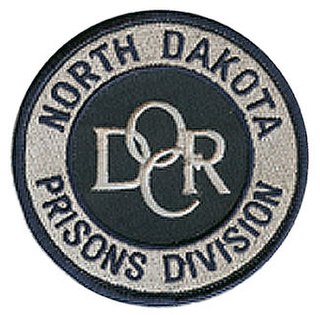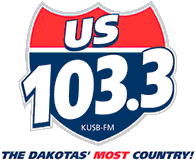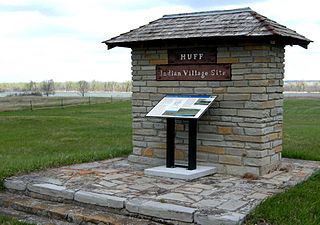
Washburn is a city in southern McLean County, North Dakota, United States. Located along the upper Missouri River, it is the county seat of McLean County. The population was 1,300 at the 2020 census.

Mandan is a city on the eastern border of Morton County and the eighth-largest city in North Dakota. Founded in 1879 on the west side of the upper Missouri River, it was designated in 1881 as the county seat of Morton County. The population was 24,206 at the 2020 census. Across the Missouri River from Bismarck, Mandan is a core city of the Bismarck-Mandan Metropolitan Statistical Area.

Arikara, also known as Sahnish, Arikaree, Ree, or Hundi, are a tribe of Native Americans in North Dakota. Today, they are enrolled with the Mandan and the Hidatsa as the federally recognized tribe known as the Mandan, Hidatsa, and Arikara Nation.

The Mandan are a Native American tribe of the Great Plains who have lived for centuries primarily in what is now North Dakota. They are enrolled in the Three Affiliated Tribes of the Fort Berthold Reservation. About half of the Mandan still reside in the area of the reservation; the rest reside around the United States and in Canada.
Huff or huffing may refer to:

Fort Abraham Lincoln State Park is a North Dakota state park located 7 miles (11 km) south of Mandan, North Dakota, United States. The park is home to the replica Mandan On-A-Slant Indian Village and reconstructed military buildings including the Custer House.

KACL is a radio station in Bismarck, North Dakota, owned by Townsquare Media airing a classic hits format competing against Radio Bismarck-Mandan's KXRV "Mojo 107.5". The station signed on in 1997 and has never changed its format, although it shifted from 1960s and 1970s music based oldies to 1970s and 1980s based classic hits in 2009.

The Fort Berthold Indian Reservation is a U.S. Indian reservation in western North Dakota that is home for the federally recognized Mandan, Hidatsa, and Arikara Nation, also known as the Three Affiliated Tribes. The reservation includes lands on both sides of the Missouri River.
The Bismarck Expressway is a state highway in Mandan and Bismarck, North Dakota, in the United States. It carries two unsigned highways: Interstate 194 (I-194) from its west end at exit 156 of I-94 to BL I-94 in Mandan, and North Dakota Highway 810 (ND 810) from BL I-94 in Mandan, around the south side of Bismarck back to BL I-94 in Bismarck. BL I-94 takes the designation from the end of ND 810 to the designation's eastern terminus at I-94 and US 83. The portion in Mandan, even where it is ND 810, is a freeway; once it crosses the Missouri River into Bismarck, it becomes a four-lane surface road.

The North Dakota Department of Corrections and Rehabilitation (DOCR) provides prison services for the state of North Dakota. The Division of Field Services supervises parolees through 14 field offices. DOCR also has a Division of Juvenile Services providing supervision and case management of delinquent youth of the state. The agency has its headquarters in Bismarck.

KUSB, known as "103.3 US Country", is a radio station located in Bismarck, North Dakota, owned by Townsquare Media that signed on September 25, 2006 with a country music format, directly competing with Clear Channel Communications' KQDY 94.5 and Radio Bismarck-Mandan's KKBO "105.9 The Big Rig".

Interstate 94 (I-94) runs east–west through the central portion of the US state of North Dakota.

The Huff Archeological Site is a prehistoric Mandan village in North Dakota dated around 1450 AD. It was discovered in the early 1900s. The site has been designated a National Historic Landmark, and is one of the best preserved sites of the period.

The Liberty Memorial Bridge, across the Missouri River connecting the "twin cities" of Bismarck and Mandan, North Dakota, also known as Missouri River Bridge, was a Warren-Turner through truss structure that was built in 1920. It was listed on the National Register of Historic Places in 1997. It was replaced by a new bridge in 2008 and removed from the National Register in 2009.

Harmon is a census-designated place (CDP) and unincorporated community in Morton County, North Dakota, United States near North Dakota Highway 1806. It is ten miles north of Mandan and is within Mandan Public Schools district. The nearby eponymous Harmon Lake Recreation Area also uses a Mandan address.

Crow Flies High State Recreation Area is a scenic overlook located two miles west of New Town in Mountrail County, North Dakota. The site provides scenic views of Lake Sakakawea. Signs describe the location's role in local history, including its significance in the explorations of Lewis and Clark. The footprint of the drowned town of Sanish, now lost below the reservoir's waves, can be seen at times of low water.

Encounters at the Heart of the World: A History of the Mandan People is a Pulitzer Prize-winning non-fiction history book by American historian Elizabeth A. Fenn about the Mandan people, a Native American tribe located in what is now North Dakota. It was published in 2014 by Hill and Wang. The book draws on a wide array of sources, including demographic, ethnographic, archaeological, epidemiological, and climatological research and records, as well as Fenn's own travels through the region.
The Bismarck-Mandan Pards were a minor league baseball team based in Bismarck, North Dakota in partnership with neighboring Mandan, North Dakota. The Bismarck–Mandan Pards played as members of the Northern League from 1962 to 1964 and in 1966. Previous Bismarck minor league teams played as members of the 1922 Dakota League, 1923 North Dakota League and the Manitoba-Dakota League from 1955 to 1957. The Bismarck–Mandan Pards were a minor league affiliate of the Minnesota Twins from 1962 to 1964 and Houston Astros in 1966. Bismarck hosted home minor league games at the Bismarck Municipal Ballpark














